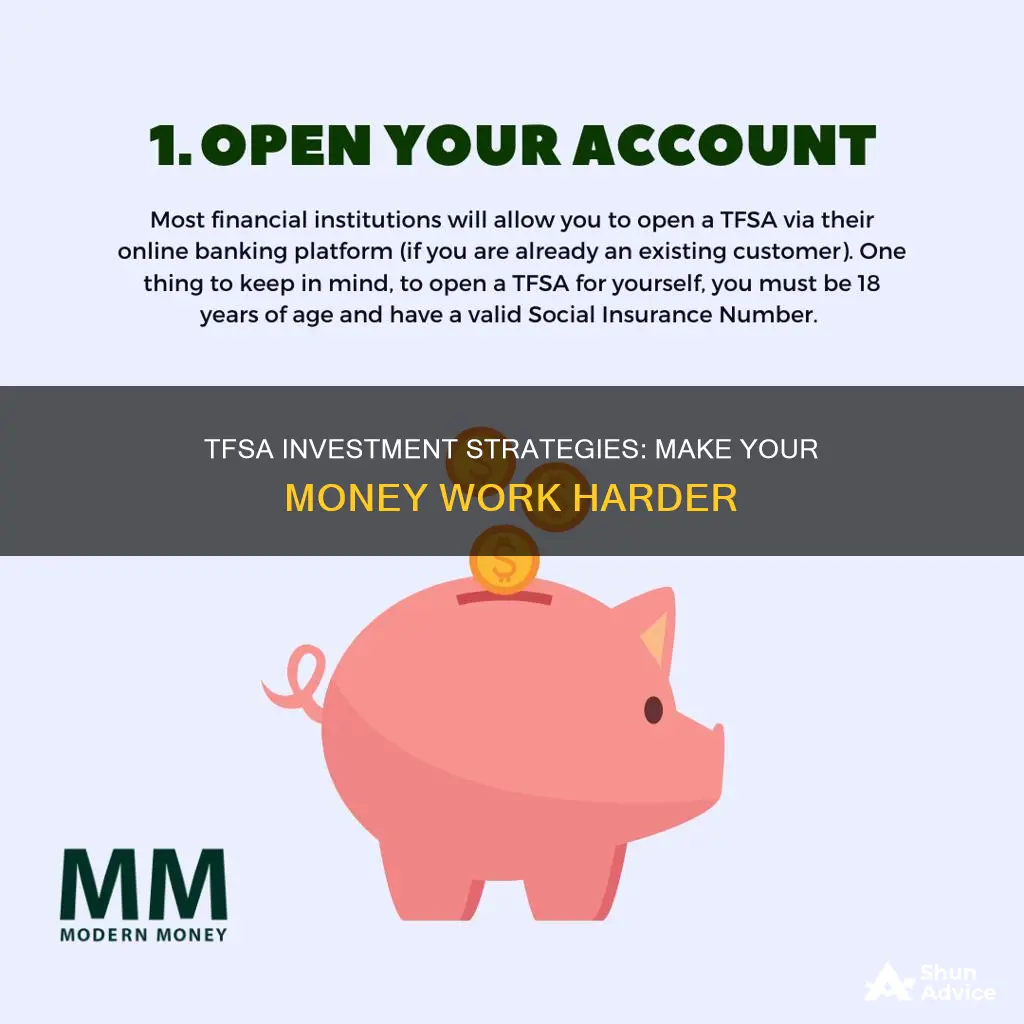
A Tax-Free Savings Account (TFSA) is a valuable investment tool for Canadians. It is a registered investment account that lets your earnings (like interest, dividends and capital gains) from qualified investments grow tax-free. You can hold a wide range of investments in a TFSA, including stocks, ETFs, fixed-income investments, mutual funds, guaranteed investment certificates (GICs), bonds, and more. The best type of investment for your TFSA depends on your time frame and what you want to use the money for. It's a good idea to consult with a financial advisor to determine the best investment strategy for your TFSA.
| Characteristics | Values |
|---|---|
| Account Type | Tax-Free Savings Account (TFSA) |
| Investment Options | Savings Account, Mutual Funds, Stocks, Bonds, Exchange-Traded Funds (ETFs), Guaranteed Investment Certificates (GICs), etc. |
| Tax Benefits | No Taxes on Interest, Investment Income, Capital Gains, or Withdrawals |
| Contribution Limit | $7,000 for 2024 |
| Eligibility | Canadian Residents Aged 18+ with a Valid Social Insurance Number (SIN) |
| Flexibility | Multiple TFSAs Allowed, Easy Withdrawals, Carry Forward Unused Contribution Room |
| Investment Horizon | Short to Medium-Term Goals, Emergency Funds, Retirement Savings |
What You'll Learn

Understanding TFSA rules
A TFSA (Tax-Free Savings Account) is a valuable investment tool for Canadians. It is a registered investment account that lets your earnings (like interest, dividends and capital gains) from qualified investments grow tax-free. Here are some of the key rules to understand:
- Contribution limits: Each year, the government sets a limit on how much you can contribute to your TFSA. For example, the limit for 2024 is $7,000. If you don't contribute the maximum amount in a given year, you can carry it forward to future years.
- Over-contribution penalties: If you contribute more than the annual limit, you will be subject to a penalty of 1% of the excess amount for each month it remains in your TFSA. Be careful when transferring your TFSA between institutions or withdrawing and re-contributing funds to avoid over-contributing.
- Investment options: A TFSA can hold a wide range of investments, including stocks, bonds, mutual funds, exchange-traded funds (ETFs), guaranteed investment certificates (GICs), and certain shares of small business corporations.
- Tax implications: Any earnings or capital gains on your TFSA investments are tax-free. Withdrawals are also tax-free and do not affect your eligibility for government benefits such as Old Age Security (OAS).
- Day trading restrictions: While you can own stocks in your TFSA, extensive trading may be deemed as carrying on a business by the CRA, and your earnings will be taxed as income.
- Multiple accounts: You can have multiple TFSA accounts with different financial institutions, but the contribution limit applies to the total of all your accounts combined.
- Self-directed TFSAs: With a self-directed TFSA held at a brokerage, you have more investment options and flexibility to build your own portfolio.
- Non-qualified investments: Certain types of investments, such as land and units of ownership in a general partnership, are not considered qualified investments and are subject to heavy taxes if held in a TFSA.
Understanding a Firm's Cash Flow from Investing Activities
You may want to see also

TFSA investment gains and losses
Gaining a basic understanding of how to invest using a TFSA is essential for making informed financial decisions. Here are some key insights about TFSA investment gains and losses:
Understanding TFSA Investment Gains
When you invest in a TFSA, you can take advantage of tax-free growth on your investments. This means that any interest, dividends, or capital gains earned on eligible investments within the TFSA are generally not taxable. This feature makes TFSA an attractive option for investors seeking tax-efficient ways to grow their savings. The annual contribution limit for TFSA is set by the government and changes periodically. For example, the limit for 2024 is $7,000. It's important to stay informed about the current contribution limits to ensure you don't exceed them.
TFSA Investment Options
TFSA offers a wide range of investment choices similar to those available for RRSPs. These include guaranteed investment certificates (GICs), stocks, bonds, mutual funds, exchange-traded funds (ETFs), and more. Each investment option has its own risk and return profile, so it's important to understand them before making a decision. GICs, for instance, offer a fixed interest rate for a specified period, making them a relatively safe investment. On the other hand, mutual funds pool money from multiple investors and are managed by fund managers, offering the potential for higher returns but also carrying higher risks.
TFSA Withdrawal Flexibility
One of the significant advantages of TFSA is the flexibility it offers regarding withdrawals. You can withdraw funds from your TFSA at any time, for any reason, without incurring tax penalties. Withdrawn amounts can also be added back into your TFSA in the following calendar year or later, giving you the option to use your TFSA for short-term or medium-term financial goals. This feature sets TFSA apart from other registered savings plans.
Understanding TFSA Investment Losses
While TFSA provides tax-free growth on investment gains, it's important to remember that investment losses within a TFSA cannot be claimed as a capital loss on your income tax return. These losses are not considered withdrawals and, therefore, do not impact your TFSA contribution room. It's crucial to carefully consider the risks associated with different investment options before making choices within your TFSA.
Understanding Initial Cash Investment: First Steps for Entrepreneurs
You may want to see also

Day trading is not allowed
The CRA will consider a range of factors to determine whether a taxpayer is using their TFSA for day trading or other business activities, including:
- The frequency of transactions—a history of extensive buying and selling of securities or quick turnover of properties.
- The period of ownership—securities are usually owned for a short period.
- The taxpayer's knowledge of securities markets.
- Whether security transactions form part of the taxpayer's ordinary business.
- The time spent—a substantial part of the taxpayer's time is spent studying the securities markets and investigating potential purchases.
- Financing—security purchases are financed primarily on margin or by debt.
- Advertising—the taxpayer has advertised their willingness to purchase securities.
- The nature of the shares—normally speculative in nature or of a non-dividend type.
The CRA does not have a clear definition of what constitutes day trading or business activities in a TFSA, as each situation is assessed independently. However, if the CRA determines that a taxpayer is carrying on a business through their TFSA, the profits will be subject to taxation as business income, rather than capital gains, along with associated interest and penalties.
Therefore, it is essential for taxpayers to be aware of the risks and tax implications of day trading in their TFSA accounts.
Marijuana Money: Investing the Green Rush
You may want to see also

TFSA investment options
A TFSA (Tax-Free Savings Account) is a valuable investment tool for Canadians. It is a registered investment account that lets your earnings (like interest, dividends and capital gains) from qualified investments grow tax-free.
The investment options available for a TFSA are similar to those for an RRSP (Registered Retirement Savings Plan). When choosing how to invest the money in your TFSA, consider the level of risk you are willing to take on and your savings goals. Here are some of the most common types of investments for a TFSA:
- Guaranteed Income Certificates (GICs): GICs are considered safe investments because you receive a guaranteed, fixed rate of return, usually higher than what a regular high-interest savings account offers. GIC terms can range from 30 days to 10 years, with the most common terms being between one and five years.
- Bonds: You can hold both government (municipal, provincial, and federal) and corporate bonds in your TFSA. Bonds provide the benefit of periodic payments throughout the term, rather than waiting until maturity to pay out in a single lump sum. Government bonds are less risky than corporate bonds but have a lower rate of return.
- Mutual Funds: Mutual funds pool money from a large group of investors and invest in stocks, bonds, and other securities on their behalf. Mutual funds are riskier than other types of investments because they have no guarantees and can fluctuate in value. They also tend to have higher management fees.
- Exchange-Traded Funds (ETFs): ETFs are similar to mutual funds but are traded like stocks on a stock exchange. ETFs have lower fees than mutual funds and typically mirror indexes or benchmarks rather than attempting to beat an index.
- Stocks: Stocks are one of the riskier types of investments to have in your TFSA but offer the potential for higher returns. Any capital gains on stocks held in a TFSA are not taxable.
You can also set up your TFSA as a simple savings account, where you place cash that earns interest at a guaranteed rate of return. This option is useful if you are saving for the short term or need easy access to cash in case of an emergency.
It's important to note that a self-directed TFSA, held with a brokerage, provides more flexibility than a regular TFSA opened at a financial institution. With a self-directed TFSA, you can invest in a wider range of options, including stocks, bonds, ETFs, and more, giving you complete control over the management of your investments.
Fidelity Investments: Are They Right for Your SMB?
You may want to see also

Types of TFSA investments
Tax-Free Savings Accounts (TFSAs) are a fantastic way to earn money on your savings, without having to pay tax on those earnings. TFSAs are available to Canadians aged 18 and older. While the word 'savings' is in the name, it's better to think of TFSAs as investment accounts, rather than simply savings accounts. Here are some of the types of investments that can be used within a TFSA:
TFSA Savings Accounts
The most basic type of TFSA. To set up a savings account within a TFSA, you must contact your financial institution and provide your social insurance number along with other identification to ensure you are an adult Canadian resident for tax purposes. It is also worth shopping around to see which bank or credit union offers the best interest rate on savings accounts.
TFSA Guaranteed Investment Certificates (GICs)
GICs guarantee a certain interest rate on a given investment for a specified period. A one-year GIC might pay 1%, for example, while a 5-year might pay 2.5%. With TFSA GICs, the interest you earn is tax-free. You can open a GIC within a TFSA with most major lenders in Canada, including banks and credit unions. There are two types of TFSA GICs: cashable/redeemable and non-redeemable. Cashable/redeemable GICs offer the flexibility to cash in your investment at any time, while non-redeemable GICs are locked in for the entire fixed term.
Exchange-Traded Funds (ETFs)
ETFs are investments that consist of a collection of securities, such as stocks or bonds, that can be traded like individual stocks, through a brokerage. They offer the flexibility of stocks with the diversification of mutual funds. ETFs are typically pegged to follow a particular market index and can be fairly hands-off compared to mutual funds, resulting in management fees and more of the funds' upside returns in your pocket.
Stocks/Equities and Bonds
Investing in stocks and bonds within a TFSA is a more advanced financial strategy that should be considered by those with some understanding of the stock market and a stomach for moderate-to-high risk. Since TFSA contributions are capped at a few thousand dollars a year, you may want to consider carefully investing in stocks and bonds that are traded on the open stock market. You can also hold foreign investments, but beware that these investments have different tax rules that may require you to pay some tax, even though you're holding them inside your tax-sheltered TFSA.
Mutual Funds
Mutual funds are among the most popular investments in Canada. They are basically a diverse collection of stocks, bonds or commodities (or a combination thereof) that are managed by a portfolio manager or financial institution. When you invest in mutual fund shares, you become a part owner of the larger fund. And, as with all TFSA investments, the money earned on mutual fund investments within a TFSA will not be taxed.
Technical Analysis: Investment Bankers' Crystal Ball
You may want to see also
Frequently asked questions
TFSA stands for Tax-Free Savings Account. It is a registered savings vehicle that allows you to grow your money without paying taxes on the interest or investment income you earn.
The main benefit of a TFSA is the tax-free growth. You can invest in a variety of options and your earnings will not be taxed. Additionally, withdrawals from a TFSA will not affect your eligibility for government benefits such as Old Age Security (OAS).
The investment options for a TFSA include savings accounts, guaranteed investment certificates (GICs), government and corporate bonds, exchange-traded funds (ETFs), stocks, mutual funds, and certain small business investments.
To open a TFSA, you must be a Canadian resident, be 18 years or older, and have a valid Social Insurance Number (SIN). You can open a TFSA at a financial institution or with a brokerage, which typically offers more investment options.
Yes, it is important to note that certain types of investments are not considered qualified investments for a TFSA, such as land, units of ownership in a general partnership, and shares of a non-Canadian company that is de-listed from a designated stock exchange. Additionally, day-trading is not allowed in a TFSA as it may be deemed a business, and earnings will be taxed as income.







